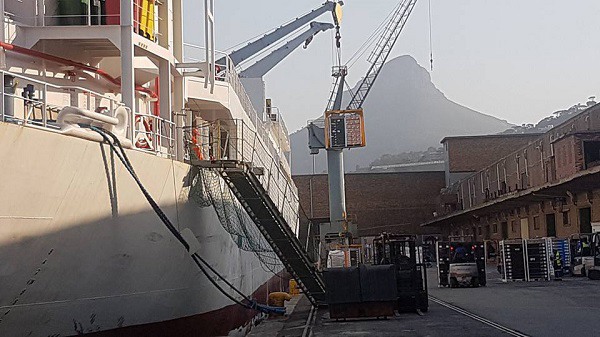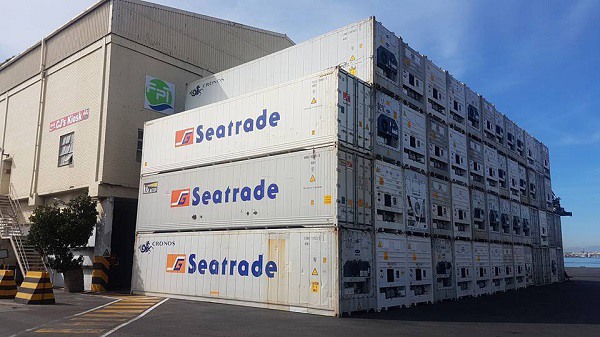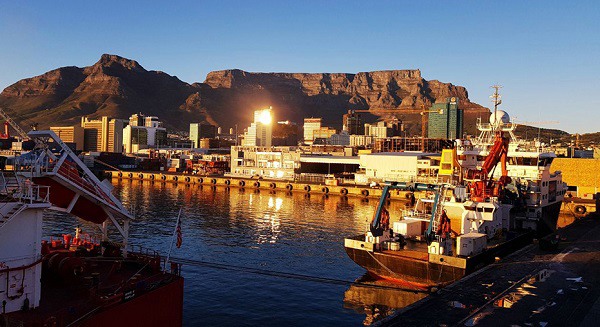 “The citrus harvest is looking very good and the volumes are approximately 10% up over 2018’s large crop, and around 25 to 30% up on last year,” says Anton Potgieter, CEO of The Logistics Group. “Our FPT terminal in Durban’s Point Precinct is chock and block full.”
“The citrus harvest is looking very good and the volumes are approximately 10% up over 2018’s large crop, and around 25 to 30% up on last year,” says Anton Potgieter, CEO of The Logistics Group. “Our FPT terminal in Durban’s Point Precinct is chock and block full.”
“The grapefruit season has just ended and it went very well. Oranges will now start coming in.”
It has been a challenge while the harbour was functioning at around 50% capacity for the first two months of lockdown, during levels 4 and 5. Reefer vessels waited much longer outside to enter port, there were bottlenecks as only essential cargo could be offloaded and non-essentials had to be evacuated.
The initial shortage of reefers during the lockdown period has improved. Conventional shipping took up some of the slack, but there are still backlogs which are slowly improving.
The new normal: a stop-start economy
“We’re very happy with the volumes, there just remains the concern that Durban could have blank sailings from the shipping lines. I’m just afraid it could come because one has to consider that South Africa is still very early on the Covid-19 curve, with a possible peak only by September or October, so we’re having to manage a stop-start economy as people have to self-quarantine while others are returning. This stop-start economy is having an impact on everything, like you’re seeing at Cape Town port. It’s a difficult environment in which to operate.”
Everyone’s a bit nervous, he says.
 Loading fruit on a conventional vessel at FPT Cape Town (photos supplied by FPT)
Loading fruit on a conventional vessel at FPT Cape Town (photos supplied by FPT)
Barge for Bayhead Rd’s legendary congestion
FPT is a large asset within The Logistics Group, a stablemate of Capespan, with terminals in Port Elizabeth, Cape Town and Durban where, as everyone knows, road congestion sometimes brings operations to a glacial pace.
FPT Durban handles 16% to 20% of the country’s citrus, with a 16,000 to 18,000 pallet floor capacity. It is located opposite the Durban Container Terminal (DCT) on the bay and during citrus peak season (like now) the facility receives over a hundred tautliners per day.
Citrus pallets are packed into reefers, but then comes the endlessly frustrating task of covering the distance of ten kilometres by road to the Durban Container Terminal, a distance that can take between 6 and 26 hours to traverse.
Over two thousand trucks inch along single-lane Bayhead Road leading into the container terminal daily, sometimes causing traffic congestion that stretches deep into Durban’s road system.
“It’s an ongoing saga,” he sighs, but they have put a nifty solution to the port authorities.
Barge could take the equivalent of a 4km line of trucks per day off the road
“We want to transport reefers with a barge across Durban Harbour. It’s not that far, if you’re fit, you can swim that distance. It makes much more sense than to put a truck on the road to drive to DCT. At the moment trucks are standing there for between 6 and 26 hours. It’s a system that’s totally malfunctioning. With a barge we could remove about 240 trucks from the road a day which is almost 4km of trucks.”
Other stakeholders in Durban agree it’s an excellent idea, he says, and he’s even looking at an electrical barge to further drive down the carbon cost of the initiative.
“Negotiations are quite far advanced. It has not yet been accepted so I haven’t yet bought my skipper’s hat but I’m quite positive we’ll be getting a barge operator’s license soon.”
He predicts the residents of Durban will, out of gratitude, erect a statue to the barge.
Patented bladder for liquid transport from their inhouse transport tech company
A very recent addition is a patented bladder for the transport of liquids like diesel, oil, molasses, sunflower oil and soybean oil. The bladder can be folded up when not in use, to reduce the very high inefficiencies of bulk transport, around 80% in South Africa, as tippers carrying mining products down to the harbour usually return empty.
Video of the bladder developed for bulk liquid transport
FPT removed their cold stores at both Port Elizabeth and Cape Town as an increasing amount of cold facilities were installed on farms to meet the demands of the growing steri markets.
Port Elizabeth is now a bulk mineral terminal, exporting manganese mined in the Northern Cape, not on citrus.
In Cape Town, apart from fresh exports, they focus on bulk like fertiliser, grain imports and general cargo.
 Containers outside FPT's offices
Containers outside FPT's offices
Matola Cargo Terminal
The company divested its cold stores at Maputo Harbour eight years ago due to decreased demand for their services. Reefer vessels weren’t calling at the harbour on a regular basis anymore, South African producers re-assessed and decided to focus on domestic harbours.
With Matola Cargo Terminal (MCT) they moved their operations inland where they set up cold stores and a distribution packhouse, as well as a Toyota forklift agency in Mozambique.
From this subsidiary they also focus on pit-to-port solutions, taking chrome from Steelpoort area to Maputo port via our brand new intermodal border rail depot at Ressano saving exporters time and money.
Contour Logistics Within The Logistics Group is a specialist clearing and forwarding company called Contour Logistics.
Within The Logistics Group is a specialist clearing and forwarding company called Contour Logistics.
The company is trying to increase the component of general cargo to cover the shoulders and off-season of the fresh produce industry.
They also provide stevedoring services for shipping lines not berthing at Transnet Port Terminals.
 FPT's terminal at Cape Town Harbour
FPT's terminal at Cape Town Harbour
 For more information:
For more information:
Anton Potgieter
The Logistics Group
Tel: +27 21 001 4764
Email: [email protected]
http://tlg.co.za/










